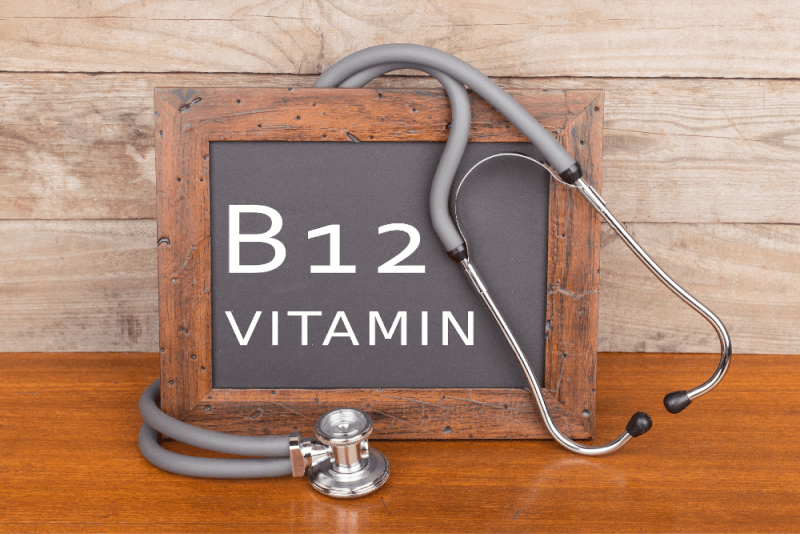30 Second Summary
- Vitamin B12 is essential for the healthy functioning of the nervous and digestive systems in the body.
- Found in foods of animal origin.
- Deficiency can lead to health problems such as fatigue, weakness, forgetfulness, irritability, skin problems and digestive problems.
- It is particularly risky for vegans and vegetarians.
Vitamin B12, one of the indispensable vitamins for the continuation of vital functions, is a water-soluble and heat-sensitive vitamin. Vitamin B12, which is found in foods of animal origin, is one of the key vitamins especially for the healthy functioning of the immune and nervous system.
What is B12?
Vitamin B12, which is not produced by the body, is one of the types of vitamin B. Vitamin B12, which has low storage in the body due to being one of the water-soluble vitamins, is involved in maintaining the health of nerve tissue and red blood cell production in the body. In addition, since it is a vitamin used in the metabolism of fatty acids and amino acids and in DNA synthesis, it is a vitamin that every cell needs.
In order to get enough vitamin B12, foods rich in this nutrient should be consumed. However, it is important to pay attention to the cooking times of these foods. Because vitamin B12 is a heat sensitive vitamin. Therefore, increasing the cooking time and temperature will cause vitamin B12 to be lost.
B12 benefits (What does it do?)
Vitamin B12 is involved in many different metabolic events in the body. In addition, vitamin B12 should be supplied regularly because it is a water-soluble vitamin. Because water-soluble vitamins cannot be stored in the body. Among the tasks that vitamin B12 undertakes in metabolism are the following:
- It is involved in maintaining the healthy functioning of the brain and nervous system.
- It has an important role in red blood cell formation.
- It is involved in the formation and regulation of DNA.
- It enables the synthesis of fatty acids.
- It helps the body absorb folic acid, which helps release energy.
- It plays a role in energy production.
- Effective in the prevention of anemia.
- Strengthens the immune system.
- It allows cells to live longer.
- Strengthens memory.
- Facilitates learning.
- Prevents nerve damage
- It ensures fertility.
What causes B12 deficiency?
B12 deficiency is usually encountered in cases where there is not enough B12 in the diet. However, there are some diseases and health conditions that can cause B12 deficiency.
Persiniscid anemia
The intrinsic factor that allows the absorption of vitamin B12 in the small intestine is not secreted sufficiently in persistent anemia. This situation causes vitamin B12 deficiency.
Autoimmune diseases
In autoimmune diseases, the immune system fights against healthy body tissues, not against factors that harm the body. As a result, healthy body tissues are damaged. One of the tissues attacked by the immune system is the tissues in the stomach that secrete intrinsic factor. In this case, B12 deficiency is seen because vitamin B12 cannot be absorbed sufficiently from the small intestine.
Bowel problems
Disturbances in the lining of the intestine make it difficult for vitamin B12 to be absorbed. For this reason, vitamin B12 deficiency is common in patients with Crohn's disease or celiac disease.
Functional B12 deficiency
People with functional B12 deficiency have normal serum B12 concentrations. However, people have symptoms of vitamin B12 deficiency. In functional B12 deficiency, the problem is the transport of vitamin B12 between cells.
Symptoms of B12 deficiency
Insufficient amounts of B12, the essential vitamin for DNA metabolism, can lead to serious health problems. Among the main reasons why vitamin B12 is not enough in the body is that foods rich in vitamin B12 are not consumed enough or even if these foods are consumed, vitamin B12 absorption in the intestines does not occur sufficiently. Symptoms of B12 deficiency may not be immediately apparent. Another factor that can cause insufficient vitamin B12 is drug interactions. Proton pump inhibitors, metformin and h2 receptor agonists used in the treatment of ulcer disease reduce the absorption of vitamin B12. Some patients do not experience any symptoms until their B12 reserves are completely depleted. For this reason, it should be monitored with regular blood tests. Among the symptoms that can be seen in vitamin B12 deficiency are the following:
- Prolonged mental fatigue
- Pain and tenderness
- Palpitations
- Yellowing of the skin
- Ringing in the ear
- Diarrhea
- Swelling of the tongue
- Difficulty walking
- Difficulty in establishing balance
- Deterioration of the nervous system
- Anemia
- Developmental delay in infants and children
- Numbness in arms and legs
- Slowing of intellectual skills
- Long-term forgetfulness
- Memory loss
- Inability to concentrate
- Chills
- Fatigue
- Mouth ulcer
- Hair loss
- Weight loss
- Skin dryness
- Loss of appetite
- Constipation
- Facial tremors in infants
- Redness and burning sensation on the tongue
- Night convulsions in the legs
- Slowing of metabolism
Psychological symptoms of B12 deficiency
Vitamin B12 deficiency shows not only physical but also psychological symptoms. These symptoms include mood disorders up to and including depression. In addition, symptoms such as psychosis, mania, dementia, confusion, irritability, decreased understanding and judgment, or inability to concentrate are also observed.
Prolonged deficiency of vitamin B12 causes irreversible damage, especially to the nervous system. Therefore, symptoms should not be ignored and a doctor should be consulted.
Groups at high risk of B12 deficiency
Vitamin B12 deficiency is especially common in people who follow a vegan diet. Because the main source of vitamin B12 is animal foods. In addition, B12 deficiency can become much more serious in people who eat a vegan diet and are pregnant or breastfeeding.
Another risk factor for B12 deficiency is pernicious anemia. Pernicious anemia, which is one of the immune system diseases affecting the blood, causes insufficient intrinsic factor that enables the absorption of vitamin B12.
Vitamin B12 is absorbed from the small intestine. For this reason, the likelihood of vitamin B12 deficiency also increases in people whose small intestine has been shortened by surgical methods. Crohn's disease or celiac disease also causes vitamin B12 not to be absorbed sufficiently.
Chronic alcoholism also causes insufficient absorption of vitamin B12. For this reason, B12 deficiency is seen in people who consume alcohol continuously and in high amounts. In addition, B12 deficiency is also likely to be seen in patients with hyperthyroidism and pregnant women whose body temperature is above normal.
The fact that vitamin B12 cannot be absorbed sufficiently with advancing age causes older individuals to be in the risk group in terms of vitamin B12 deficiency. In addition, groups at risk for B12 deficiency include children, people with diabetes, people who have had stomach surgery and people taking proton pump inhibitors for heartburn.
Reference and dangerous values for B12
B12 reference values may vary according to laboratories. This is because laboratories use different measurements and test different samples. Basically, values above 300 pg/ml are considered normal. However, since vitamin B12 is used in every cell, the healthiest range is considered to be between 800 and 1000 pg/ml. Values below 200 pg/ml indicate B12 levels. Since vitamin B12 decreases with age, it is especially important for older individuals to monitor their B12 levels regularly. In addition, infants, children and pregnant women need more B12 per day.
In order to diagnose B12 deficiency, values must be lower than 160 pg/ml. If B12 levels are lower than 100 pg/ml, symptoms begin to appear in adults.
B12 deficiency treatment
Vitamin B12 deficiency causes serious and irreversible deformations in the body. For this reason, vitamin B12 levels should be kept at an optimal level. The treatment for people with B12 deficiency is extremely simple and successful. In vitamin B12 deficiency, patients are given vitamin B12 supplements. In some patients, oral medication is sufficient to eliminate the deficiency, while in some patients, B12 supplements are given as an injection application.
How long should vitamin B12 be used?
The duration of vitamin B12 use varies according to patients. The duration of oral vitamin B12 use varies from one week to several weeks. The frequency of recurrence of vitamin B12 administered as intramuscular injection varies between 7 and 10 days. The time intervals for maintenance doses are determined by physicians. For this reason, you can get precise information about how long vitamin B12 should be used from your doctor.
Nutrition in B12 deficiency
Vitamin B12 is a vitamin that can be easily supplied with food. It is not possible to obtain enough vitamin B12 found in animal-based foods from plant sources. For this reason, it is necessary to include enough foods of animal origin in the daily diet. The foods richest in vitamin B12 are the following:
- Cheese
- Milk
- Shrimp
- Mussel
- Kidney offal
- Egg
- Yogurt
- Liver offal
- Fish
- Chicken
- Red meat
- Tuna fish
- Salmon
- Oyster
- Spinach
- Beetroot
- Potato
- Mushroom
- Clover
- Maya
- Oat bran
- Corn flakes
- Nori
What does vitamin B12 deficiency lead to?
Since vitamin B12 has very important functions in the body, its deficiency causes serious health problems. One of the most important of these problems is health problems in the nervous system. Neurological problems caused by vitamin B12 deficiency include the following:
- Vision problems
- Memory loss
- Tingling sensation
- Physical coordination disorders
- Speech difficulties
- Difficulty walking
- Disorders in the nervous system, especially in the legs
Another health problem that vitamin B12 deficiency can cause is infertility. However, infertility caused by vitamin B12 is temporary and disappears when the deficiency is corrected. Vitamin B12 deficiency in pregnant women causes the baby in the womb to be affected. In this case, health problems that can be seen in babies include the following:
- Neural tube defect
- Damage to the brain or skull
- Premature birth
- Low
If B12 deficiency occurs in children and infants, it affects the cognitive activities of children, especially developmental delay. In children with B12 deficiency, lack of concentration, impaired learning and perception functions are observed. It is also known that children with B12 deficiency get sick more often.
B12 deficiency also causes anemia. This is why anemia worsens if left untreated for a long time. Worsening anemia severely reduces the oxygen carrying capacity of the blood. To compensate for the reduced oxygen levels, the heart works faster and the pulse rate increases. If this condition persists for a long time, the heart loses its ability to contract strongly.
Why use vitamin B12 supplements?
Vitamin B12 supplements should be recommended by doctors and used accordingly. Excess vitamin B12 does not cause any problems in the body, but unnecessary use should be avoided. Vitamin B12 supplements help people with B12 deficiency.
The most common use of vitamin B12 supplements is, of course, to treat deficiency. In addition, vitamin B12 is used in the treatment of anemia. In addition, vitamin B12 is also used in the treatment of homocysteine levels. However, studies are not clear how elevated homocysteine levels play a role in heart disease and other health problems related to blood vessels. Therefore, homocysteine levels should not be affected unless homocystinuria is suspected.
In addition, according to a recent study, taking vitamin B12 together with B6 and folic acid reduces the risk of AMD, which causes heart disease in women.
B12 and forgetfulness
Forgetfulness and memory loss can be seen in vitamin B12 deficiency. For this reason, there is a lot of research on the link between forgetfulness and vitamin B12. Although vitamin B12 deficiency can cause forgetfulness, it has not yet been proven that too much B12 intake has positive effects on memory. However, the general opinion is that vitamin B12 strengthens memory.
How to overcome B12 deficiency during pregnancy?
Since B12 reserves are depleted more rapidly during pregnancy, as well as being extremely important for the development of the baby, it is necessary to switch to a B12-rich diet from the start of pregnancy planning. In terms of the baby's brain and spinal cord health, B12 values should be checked during pregnancy and supplements should be used if necessary.
How to overcome B12 deficiency in infants?
B12 deficiency in infants is seen as an indicator of hematologic, neurologic and gastrointestinal diseases. Because breast milk contains enough vitamin B12 for the baby. Although B12 deficiency is rare in infants, it usually occurs between 4 and 10 months of age.










